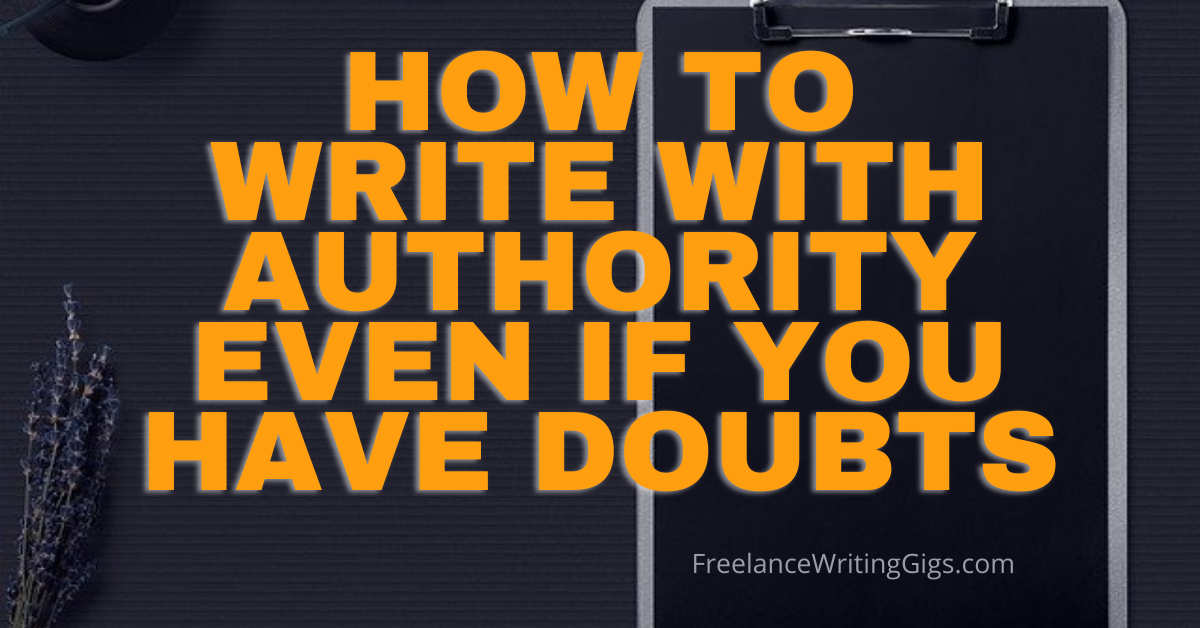We all have doubts. In an article I wrote some years ago, I mentioned one reason writers might feel self-doubt more than others.
Everyone experiences self-doubt now and then. It’s part of being human, and writers are not exempt from this. In fact, I would go as far as to say that writers probably experience self-doubt more than other people. This is because we create things by transforming abstract ideas into concrete, readable words; and this makes us prone to criticism – whether constructive or not.
(You can read the full article here.)
I’m sure you’ve had at least one experience this year when you worked on a project – for yourself or for a client – and you felt that you didn’t really know what you were doing. That you second-guessed yourself.
What do I really know about this topic?
Why would anyone listen to me when there are countless gurus talking about this?
What am I doing???
The bad news is that it can happen to anyone – to you and me. There’s even a name for it: impostor syndrome.
The Caltech Counseling center defines this as:
…a collection of feelings of inadequacy that persist even in face of information that indicates that the opposite is true. It is experienced internally as chronic self-doubt, and feelings of intellectual fraudulence.
Do you recognize these feelings? Do you struggle with them in relation to your work?
Don’t worry – there’s good news. You’re not alone. In fact, if you’re part of the millennial demographic, then you’re part of the 70% who have this syndrome.
Additionally, the impostor syndrome is actually associated with high-achieving people! If you have those feelings, you may actually be more successful than you perceive yourself to be.
That being said, even though you may have the impostor syndrome, you can still write like a rock star. (Yes, I went there.)
How to write with authority
There are two main things you need to do.
One, change your way of thinking.
Two, make changes in your writing.
Let’s take a closer look, shall we?
Change your way of thinking
This is simple and difficult at the same time.
It’s simple because saying you’re good at what you do and that you’re successful is easy. It’s difficult because actually believing that may take more effort.
Here are three concrete steps you can take to help yourself believe in yourself.
- Remember the time when you first started as a writer. Where were you in life? What did you write about? How much did you earn (per word/article/project)?
- Think about the times you lost a client, couldn’t get gigs, and other instances which brought you down. Now think about what you did. Perhaps you doggedly looked for new gigs or took the chance to improve your skills.
- Fast forward to today. What milestones have you achieved since you first started? List them down no matter how small they may seem. Compare your status today to when you first started.
Take as much time as you need to find the things you’ve achieved – and that includes bouncing back from failure. By the end of Step 3, your confidence should have gotten a boost.
Change your writing
Just as important as shifting your mindset is taking action so that your writing exudes authority. Once you’ve established your self-worth, this will naturally exhibit itself in your work. But there are also concrete things you need to do to make your writing more powerful.
Always have a clear message. Whether you believe in yourself or not, if you do not have a clear message, you really don’t know what you’re doing. Before you write a single word, think of what you need to get across AND write it as clearly as possible.
For this article, my goal is to help empower you to write confidently even if you aren’t sure of yourself.
Ensure you get your message across. You’ve got a clear message, now write purposefully. Remember that you’re writing for people who have a need/problem to be solved. Simplify things. Go straight to the heart of the matter.
Other things that will state your message clearly and boost your authority (these will not only make you feel more confident but add to your credibility).
- Use statistics. I hated every statistics class I had in college, but I have to admit that they taught me that numbers don’t lie. Readers know that, too. That’s why numbers – from reputable sources, of course – should be a regular fixture in your work.
- Use quotes from well-known individuals. Or, as they call them these days, influencers. Who these individuals are will depend on what you’re writing about, of course, but if you’re serious about your job, then you are updated on who’s who in your niche so it won’t be difficult to remember/find a relevant quote.
- Write headlines that will make YOU want to read the article. In journalism, headlines are one of the most important elements. The same can be said when it comes to writing online. I struggle with headlines. A lot. That is why I spend considerable time coming up with a title that I’m happy with. There are formulas to write the ultimate titles (do a quick search for “headline formulas”), but based on my experience, Buffer’s resource is the most useful one. However, I would like to point out that just because these formulas exist doesn’t mean you have to use them as is. Feel free to put yourself in the reader’s shoes and tweak your headline so that you yourself will want to click on it.
Use power words
“I believe the road to hell is paved with adverbs, and I will shout it from the rooftops. To put it another way, they’re like dandelions. If you have one on your lawn, it looks pretty and unique. If you fail to root it out, however, you find five the next day… fifty the day after that… and then, my brothers and sisters, your lawn is totally, completely, and profligately covered with dandelions. By then you see them for the weeds they really are, but by then it’s—GASP!!—too late.” ― Stephen King, On Writing: A Memoir of the Craft
Power words pack a punch, leaving no doubt as to what you want to say. They remove the need for fluff (adverbs much?). By using power words, you create articles that make people want to read and take action.
It all goes back to clarity.
How do you identify power words? Thank goodness for the internet and for people who do some of the legwork for us. There is no lack of material on power words online. Here are some resources to save in a file or print out.
- 317 Power Words That’ll Instantly Make You a Better Writer
- Turbo-Charge Your Marketing With These 355+ Power Words
- 79 Power Words to Create Striking Content For Your Blog
In closing
Writing with confidence is a combination of perception of self-worth and concrete writing practices. By working on these two fronts, you can take your work to the next level, get better-paying jobs, and expand your client base.
Go get ’em, tiger!
First published in 2016; updated December 2021





Leave a Reply